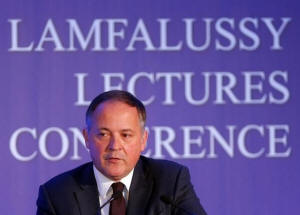|
 Market
turmoil could hold back euro zone inflation: ECB's Coeure Market
turmoil could hold back euro zone inflation: ECB's Coeure
 Send a link to a friend
Send a link to a friend
[February 13, 2016]
FRANKFURT (Reuters) - Europe's
financial market turmoil could delay a rise in inflation even further
and banks will need to be fixed with forceful action over time, European
Central Bank Executive Board member Benoit Coeure told a German
newspaper on Saturday.
|
|
 The euro area inflation outlook is already weighed down by sharply
lower oil prices and slowing global growth, and the market
volatility is compounding the problem, Coeure told Rheinische Post. The euro area inflation outlook is already weighed down by sharply
lower oil prices and slowing global growth, and the market
volatility is compounding the problem, Coeure told Rheinische Post.
"If that (volatility) continues for too long, it can also increase
the risk of a rise in inflation being delayed," Coeure said.
Euro zone bank shares <.SX7E.> are down nearly 30 percent since the
start of the year on concerns about profitability, potentially
increasing the cost of capital for banks and holding back lending.
That could reduce the effectiveness of the ECB's 1.5 trillion asset
buying program, its key monetary policy tool.
The ECB is buying assets, mostly government bonds, to boost lending
and raise inflation back to its target of nearly 2 percent from
around zero after three straight years of misses.
 Coeure said banks are facing low profitability and some are
struggling with a high level of non-performing loans, a legacy of
the Europe's economic crisis. But they are also more resilient than
in the past, thanks to years of capital increases.
"None of these challenges are new: they have been clearly
identified, they require forceful action and they will be solved
over time," Coeure said.
Coeure added that it was also up to euro zone governments to enact
growth friendly policies, which could then boost output and
eventually help boost banking profitability.
[to top of second column] |

"If this does not happen, we will have to keep rates low for a very
long time," he added.
"Our advice to euro area governments is to use the savings gained
from the lower cost of debt refinancing in a growth-friendly way to
help their citizens," Coeure added.
He said government should reduce taxes on labor, create more
incentives for private investment, or reduce their deficits where
required.
(Reporting by Balazs Koranyi; Editing by Toby Chopra)
[© 2016 Thomson Reuters. All rights
reserved.]
Copyright 2016 Reuters. All rights reserved. This material may not be published,
broadcast, rewritten or redistributed.
 |